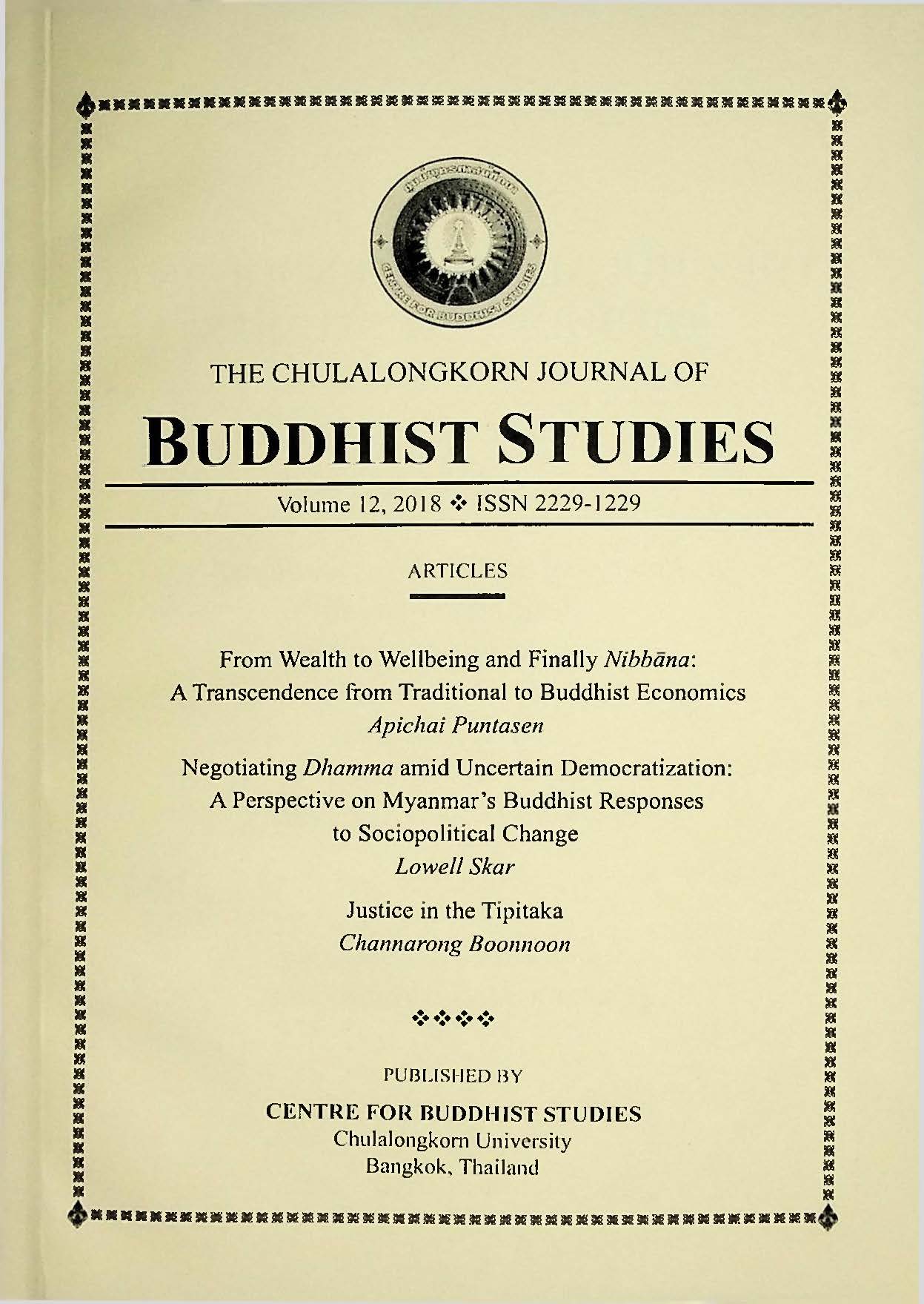Justice in the Tipitaka
Keywords:
social justice, moral justice, karmaAbstract
The objective of this research is to study concepts of “justice” and “social justice” in Pali Tipitaka, Theravada's essential texts, under two main directions: (1) a study of the concept “moral justice” that appears in the teachings on the law of karma and rebirth to find out whether it can be a basis of “social justice”; (2) an inquiry into the concept “social justice” from Buddhist teachings on society and state in the Sulfas, and the Vinayas, which formally govern the monastery (the sangha).
The study indicates that Buddhism accepts two conceptions of justice, i.e. universal and social. The former, based on the Buddha's teachings on karma, states that a moral law exists and governs the realization of sequences of behavior in proportion to their deeds. This law functions dynamically and causally beyond human’s understandings. Descriptive orientation and theoretical complexity of the teachings impedes its explanatory and evaluative application to social relations. The latter, founded on the Buddha’s sociopolitical teachings, focuses on immediate life situations. Believing that individual and society, as well as citizens and state-power structure, are interrelated; and that “AH humans desire a good life that is made possible in a just society,” Buddhism employs human basic features as main criteria for an arrangement of systems to distribute goods and wrongs. The study proposes that justice rooted in sociopolitical context leading itself to application to general society is more applicable and beneficial than justice defined by the law of karma.
References
Boonnoon, C. “Social Justice in Buddhist Perspective,” Journal of Buddhist Studies Chidalongkorn University 17:2 (2010): 36-93.
Changkwanyuen, P. Political Thoughts in the Tipitaka. Bangkok: Chulalongkorn University Press, 1991.
Changkwanyuen, P. . Dhammaratta-Dhammaraja. Bangkok: Chulalongkorn University Press, 1999.
Department of Religious Affairs, Ministry of Education. The Tipitaka (Thai Edition), Vols. 1-45. Bangkok: Department of Religious Affairs Press, 1971.
Mahamakut Buddhist University. The Tipitaka and Commentaries, Vols. 1-91. Bangkok: Mahamakut Buddhist University Press, 1998.
Na Rangsi, S. Buddhist Philosophy from the Tipitaka. Bangkok: Chulalongkorn University Press, 2000.
Phra Dhammapitaka (P. A. Payutto). Buddhadhamma. Bangkok: Mahachulalongkomrajavidyalaya University, 1995a.
Phra Dhammapitaka (P. A. Payutto). The Complexities Surrounding the Vinaya. Bangkok: Buddhadhamma Foundation, 1995b
Promta, S. “Suffering in Buddhist Philosophy: A Darwinian Perspective.” Journal of Buddhist Studies Chulalongkorn University 7:1 (2000): 2-80.
Promta, S. “Research Project: ‘Buddhism and Capital Punishment’.” Journal of Buddhist Studies Chulalongkorn Univers ity 12:3 (2005): 5-116.
Puntasen, A. Buddhist Economics: Evolution, Theories and Its Application to Various Economic Subjects. Bangkok: Amarin Publishing Group, 2005.
Satha-Anand, S. Faith and Wisdom. Bangkok: Chulalongkorn University Press, 2002.
Somboon, V. Good Governance of the Past. Bangkok: Komol Keemthong Press, 1989.
Somboon, V. The Noble Disciplines for the 21st Century. Bangkok: Komol Keemthong Press, 2002.
The Tipitaka-Tika, Electronic Version, Thai Translation, 3 Versions. Nakhon Pathom: Computer Institute, Mahidol University, 1994.
Campbell, T. Justice. New York: St. Martin’ Press, 2001.
Cho, S. “Selflessness: Toward a Buddhist Vision of Social Justice.” Journal of Buddhist Ethics 7 (2000): 76-85.
Fenn, M. “Two Notions of Poverty in the Pali Canon.” Journal of Buddhist Ethics 3 (1996): 98-125.
Garvey, S. P. 2003. “Restorative Justice, Punishment and Atonement.” Utah Law Review 1 (2003): 203-317.
Harvey, P. An Introduction to Buddhist Ethics. Cambridge, UK: Cambridge University Press, 2000.
Harvey, P. An Introduction to Buddhism: Teachings, History and Practices. Cambridge, UK: Cambridge University Press, 1990.
Hallisey, C. 1996. “Ethical Particularism in Theravada Buddhism.” Journal of Buddhist Ethics 3 (1996): 32-43.
Kalupahana, D. J. Ethics in Early Buddhism. Honolulu: University of Hawaii Press, 1995.
Kaufman, W. “Karma, Rebirth, and The Problem of Evil.” Philosophy East and West 55 (January 2005): 15-32.
Keown, D. “Karma, Character, and Consequentialism.” Journal of Religious Ethics 24 (1996): 329-350.
Loy, D. R. “How to Reform a Serial Killer: The Buddhist Approach to Restorative Justice.” Journal ofBuddhist Ethics 7 (2000): 145-168.
Payutto, P. A. Good, Evil and Beyond. Bangkok: Buddhadhamma Foundation, 1999.
Reichenbach, B. R. 1990. The Law of Karma: A Philosophical Studies. Honolulu: University of Hawaii Press, 1990.
Ryan, A., ed. Justice. New York: Oxford University Press, 1995.
Satha-Anand, S. “Karma as Moral Justice in Thai Buddhism.” Manusya, Special Issue 4 (2002): 72-83.
Wright, S. D. “Critical Questions Toward a Naturalized Concept of Karma in Buddhism.” Journal of Buddhist Ethics 2 (1994): 78-93.







